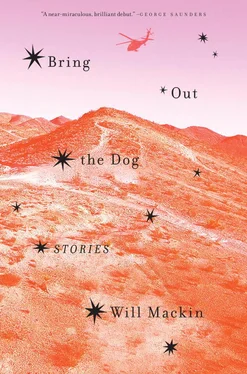Will Mackin - Bring Out the Dog
Здесь есть возможность читать онлайн «Will Mackin - Bring Out the Dog» весь текст электронной книги совершенно бесплатно (целиком полную версию без сокращений). В некоторых случаях можно слушать аудио, скачать через торрент в формате fb2 и присутствует краткое содержание. Город: New York, Год выпуска: 2018, ISBN: 2018, Издательство: Random House Publishing Group, Жанр: prose_military, на английском языке. Описание произведения, (предисловие) а так же отзывы посетителей доступны на портале библиотеки ЛибКат.
- Название:Bring Out the Dog
- Автор:
- Издательство:Random House Publishing Group
- Жанр:
- Год:2018
- Город:New York
- ISBN:978-0-812-99564-0
- Рейтинг книги:5 / 5. Голосов: 1
-
Избранное:Добавить в избранное
- Отзывы:
-
Ваша оценка:
- 100
- 1
- 2
- 3
- 4
- 5
Bring Out the Dog: краткое содержание, описание и аннотация
Предлагаем к чтению аннотацию, описание, краткое содержание или предисловие (зависит от того, что написал сам автор книги «Bring Out the Dog»). Если вы не нашли необходимую информацию о книге — напишите в комментариях, мы постараемся отыскать её.
Bring Out the Dog — читать онлайн бесплатно полную книгу (весь текст) целиком
Ниже представлен текст книги, разбитый по страницам. Система сохранения места последней прочитанной страницы, позволяет с удобством читать онлайн бесплатно книгу «Bring Out the Dog», без необходимости каждый раз заново искать на чём Вы остановились. Поставьте закладку, и сможете в любой момент перейти на страницу, на которой закончили чтение.
Интервал:
Закладка:
J.J., standing under the darkened streetlight, was an ex-smoker who would’ve lapsed during times like this but for a cigarette’s telltale glow. Still, he eased his nerves pretending. By his pantomime I knew that he’d held his cigarette between his ring and middle fingers, flicking the ash with a card-trick action of his thumb. His whole hand had covered his mouth as he’d brought the filter to his lips and inhaled. That night, in late March, his exhalation was warm enough, or the air cold enough, to create what appeared to be smoke.
J.J. gave the signal, Mike kicked open the door, and the assaulters funneled in. I remained outside, watching the alley between the target building and its eastern neighbor, while Spot kept an eye on the western alley. A trickle of sewage ran out of my alley and into the street. Or was it gasoline? Our target building in Qa’im had been booby-trapped with gas cans duct-taped with nails. Former members of Saddam’s Republican Guard had waited for the assaulters to get far enough inside before triggering the explosions via remote control. But this smelled more like shit. Or did it? As the assaulters ran though the building, I debated whether or not to break radio silence to warn them about something that might turn out to be nothing. Zsa-Zsa beat me to it.
“The refrigerator is padlocked,” he broadcast over troop common from the kitchen.
Tull chimed in from a bedroom on the second deck: “The walls and ceiling are mirrored.”
Then Bobby, from the back alley: “I got a car up on blocks.” These observations tended to snowball.
“Shut your fucking traps,” Spot told everyone on that frequency.
The remainder of the assault passed in silence, and the search for intelligence began. Spot sent me in. I ran through the front door and into the living room, where I flipped cushions off the couch. As a tech, I was looking for phones, SIM cards, flash drives, and those same things disguised as, or hidden within, something else. I worked by the red light of my headlamp. The TV remote was just that; the clock radio on the kitchen counter flashed midnight or noon; the refrigerator was indeed padlocked. I opened it with bolt cutters and dipped my hand into every cold pail of cream. Moving on, I lifted the lid on every dented teapot. I dug my knife into the flour jar, the sugar bowl. I climbed the stairs to the second floor. There I found Tull staring at a Big Wheel parked in the hall. I continued up the stairs to the third floor. Mike stood in a doorway.
“C’mere,” he whispered.
I followed Mike into a room with an open window. A boy sat on his bed.
“I need to go up on the roof,” Mike said. “Can you keep an eye on him?”
“Sure,” I said.
The boy’s bare chest was congenitally sunken. His teeth chattered. Blue night creeping in the window mixed with the red glow of my headlamp to render him purple. I knew the Arabic word for “stand.” The boy stood. His pajama bottoms were printed with soccer balls. I patted them down and squished the pockets. The boy was clean. I told him, in English, to sit back down on his bed, which he did. I showed him how to lace his fingers together and rest his hands on top of his head. We looked at each other, both of us with our fingers laced, hands on top of our heads. I told him to stay just like that.
I found a computer hidden under a blanket beneath the boy’s desk. I removed the blanket and set the computer on top of the desk. It was a work in progress, a kludge of salvaged components, and quite possibly an innocent hobby, though I wouldn’t know for sure until I’d taken the hard drive back to the lab, for analysis.
The boy had mounted a SATA drive on a fourteen-inch aluminum rack, along with a 480-watt power supply. He’d used eight billion of these itty-bitty fucking screws. I removed my micro tool set from my side pocket. Opening its plastic case released the smell of the lab—a mix of acetone and ozone that never failed to calm me. I began unscrewing the world’s tiniest screws with the world’s tiniest screwdriver.
Meanwhile, the rest of the troop was wrapping things up. They slipped past the boy’s room. They crept down the stairs. They lined up in the street, ready to leave. Approximately four billion screws remained. I decided to break the drive off the rack. I bent it up, hard as I could. I pushed it down, same. I bent it up again, this time harder, harder—
BANG!
I thought the door to the boy’s room had slammed shut. But I turned to find Mike in the doorway, smoke rising from his chamber. The boy, still sitting on the bed, looked unhurt. His eyes were wide open, his arms straight up. There was a chip in the cinder-block wall behind him, high and right. Mike didn’t take a second shot, as we were trained to. As was, by then, all but reflexive. He just penetrated the room with his eyes down his sights, and reached into one of the boy’s pajama pockets.
“He’s clean,” I said.
But Mike pulled something out. He flipped it over in his hand. It was a black box the size of a deck of cards. Mike looked for switches, wires, antennas—anything to indicate that it might transmit a signal, activate a fuse, detonate explosives, and bring the whole building down on our heads.
Spot appeared, bottom lip packed with chew, lazy eye twitching. Taking the box from Mike, he performed his own inspection.
“He was digging in his pocket for it,” Mike said.
Spot held the box at arm’s length. “You think it’s a trigger?” he asked me.
Triggers were walkie-talkies, cordless phones, and garage door openers.
“No,” I said.
The three of us turned our headlamps on the boy. His arms, which had lowered maybe half an inch, shot back up, revealing curls of pit hair. Shadow filled the depression in his chest.
“What is this?” Spot asked in his rinky-dink Arabic.
The boy shrugged.
“Get him some shoes,” Spot said.
I KNOTTED THE elastic so the hood would stay on the boy’s face. I looped the zip ties back around so he couldn’t work his hands free. He was twelve, maybe thirteen. Right at the lower end of what we considered fighting age. In his closet were a pair of sneakers with light-up soles, and loafers decorated with brass buckles. I led him out of his room, in the loafers, and onto the stairs, down which he moved like he’d never descended a flight of stairs. I steered him out the front door and across the muddy garden of trampled dandelions. Holding the boy by the arm, I took my place among the troop lined up along the curb.
J.J. signaled, Move, and Zsa-Zsa stepped off on point. Bobby stepped off ten yards behind Zsa-Zsa. Lou waited for Bobby to walk his ten yards. Meanwhile, Bobby stared at a storm drain on the other side of the street. A dull glow, visible on night vision, emanated from the grate. It could’ve just been heat rising off the sewage below, but then again, it could’ve been something else. Something that might climb up into the street and end our unusual streak of good luck. The glow surged, Bobby raised his rifle, and I tightened my grip on the boy’s upper arm. I felt his pulse quicken. Closing on the storm drain, Bobby hit it with sparkle.
We each had a device mounted to our rifles that generated sparkle—i.e., an infrared spotlight with a laser at its center. We used it to illuminate targets, and to see into dark places we otherwise couldn’t. Bobby’s infrared spotlight, for example, brightened the depths of the storm drain. His laser skipped across its heavy iron grate. Below the grate, shadows opened and closed like doors. Waves appeared in the infrared beam, diverging from the laser like ripples from a stone dropped in a lake. Which was the opposite of what I’d observed the night before, in Qa’im.
Читать дальшеИнтервал:
Закладка:
Похожие книги на «Bring Out the Dog»
Представляем Вашему вниманию похожие книги на «Bring Out the Dog» списком для выбора. Мы отобрали схожую по названию и смыслу литературу в надежде предоставить читателям больше вариантов отыскать новые, интересные, ещё непрочитанные произведения.
Обсуждение, отзывы о книге «Bring Out the Dog» и просто собственные мнения читателей. Оставьте ваши комментарии, напишите, что Вы думаете о произведении, его смысле или главных героях. Укажите что конкретно понравилось, а что нет, и почему Вы так считаете.












